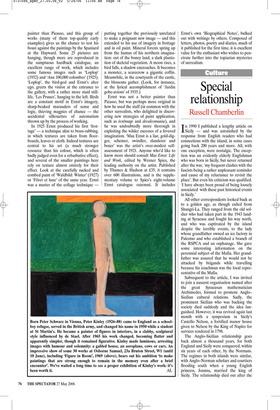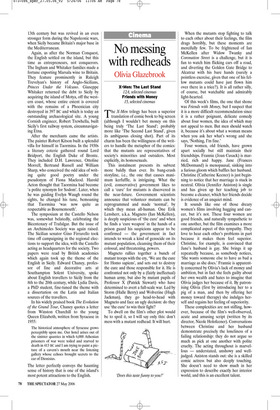Special relationship
Russell Chamberlin
In 1990 I published a lengthy article on Sicily — and was astonished by the response from English readers who had connections with the island, in some cases going back 200 years and more. All, with one exception, were nostalgic. The exception was an evidently elderly Englishman who was born in Sicily, but never returned after the war, ‘my frequent clashes with the fascists being a rather unpleasant reminder and cause of my reluctance to revisit the place’. But even his criticism was qualified. ‘I have always been proud of being loosely associated with these past historical events in Sicily.’ All other correspondents looked back as to a golden age, as though exiled from Shangri-La. They ranged from the old soldier who had taken part in the 1943 landing at Syracuse and fought his way north, and who was captivated by the island despite the terrible events, to the lady whose grandfather owned an ice factory in Palermo and who established a branch of the RSPCA and an orphanage. She gave some interesting information on the perennial subject of the Mafia. Her grandfather was assured that he would not be attacked by brigands while travelling because his coachman was the local representative of the Mafia.
Subsequent to the article, I was invited to join a nascent organisation named after the great Syracusan mathematician Archimedes, formed to promote Anglo– Sicilian cultural relations. Sadly, the prominent Sicilian who was backing the society died suddenly and the idea languished. However, it was revived again last month with a symposium in Sicily’s Castello Nelson, a fortified manor house given to Nelson by the King of Naples for services rendered in 1798.
The Anglo–Sicilian relationship goes back almost a thousand years, for both England and Sicily were conquered, within six years of each other, by the Normans. The regimes in both islands were similar, with Anglo–Norman scholars and courtiers flooding south when a young English princess, Joanna, married the king of Sicily. The relationship died out after the 13th century but was revived in an even stronger form during the Napoleonic wars, when Sicily became Britain’s major base in the Mediterranean.
Again, as after the Norman Conquest, the English settled on the island, but this time as entrepreneurs, not conquerors. The Ingham and Whitaker families made a fortune exporting Marsala wine to Britain. They feature prominently in Raleigh Trevelyan’s history of Anglo–Sicilians, Princes Under the Volcano. Giuseppe Whitaker returned the debt to Sicily by acquiring the island of Motya, off the western coast, whose entire extent is covered with the remains of a Phoenician city destroyed in 397 BC and which is today an outstanding archaeological site. A young Cornish engineer, Robert Trewhella, built Sicily’s first railway system, circumnavigating Etna.
After the merchants came the artists. The painter Robert Kitson built a splendid villa for himself in Taormina. In the 1930s a literary coterie gathered round Lord Bridport, the English Duke of Bronte. They included D.H. Lawrence, Ottoline Morrell, Bertrand Russell and William Sharp, who conceived the odd idea of writing quite good poetry under the pseudonym of Fiona Macleod. Harold Acton thought that Taormina had become ‘a polite synonym for Sodom’. Later, when he was guiding Evelyn Waugh round the sights, he changed his tune, bemoaning that Taormina ‘was now quite as respectable as Bournemouth’.
The symposium at the Castello Nelson was, somewhat belatedly, celebrating the Bicentenary of Trafalgar. But the issue of an Archimedes Society was again raised. The Sicilian senator Gino Firrarello took time off campaigning in the regional elections to support the idea, with the Castello acting as headquarters for the society. Two papers were read by British academics which again took up the theme of the English in Sicily. Edward Chaney, professor of fine and decorative arts at Southampton Solent University, spoke about English travellers to Sicily from the 8th to the 20th century, while Lydia Davis, a PhD student, fine-tuned the theme with a dissertation on the Latin and Italian sources of the travellers.
In his widely praised book The Evolution of the Grand Tour, Chaney quotes a letter from Winston Churchill to the young Queen Elizabeth, written from Syracuse in 1955: The historical atmosphere of Syracuse grows perceptibly upon me. Our hotel arises out of the sinister quarries in which 6,000 Athenian prisoners of war were toiled and starved to death in 413 BC and I am trying to paint a picture of a cavern’s mouth near the listening gallery whose echoes brought secrets to the ear of Dionisius.
The letter perfectly conveys the haunting sense of history that is one of the island’s most potent attractions to the English.











































































































 Previous page
Previous page